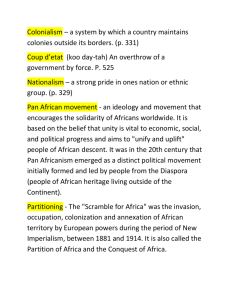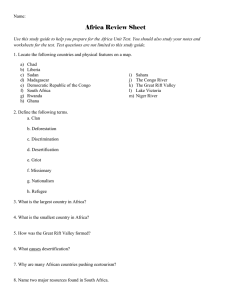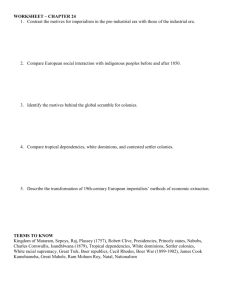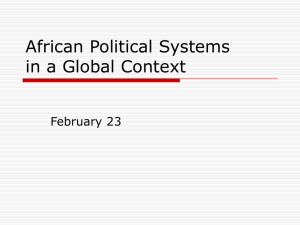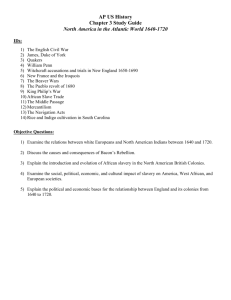Decolonization & Nationalism in Africa
advertisement
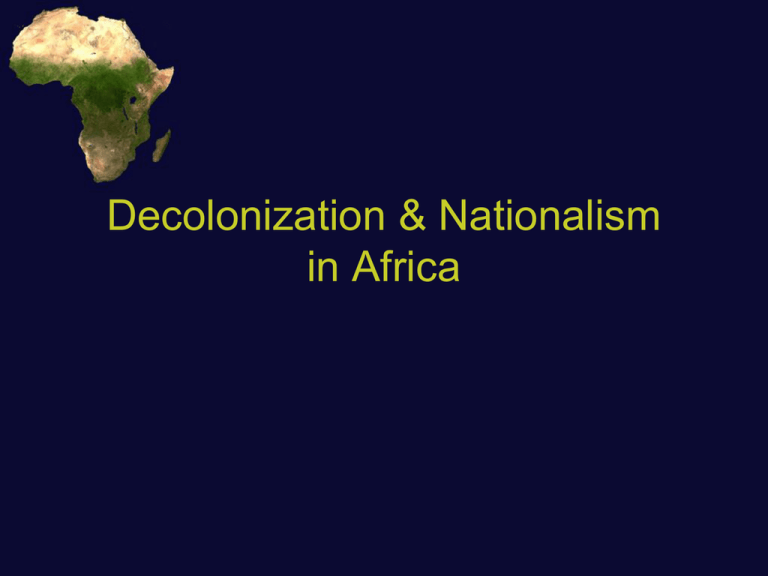
Decolonization & Nationalism in Africa Road towards independence • Post-WWII - a focus on self-determination in Europe • Colonialism seemed to contradict the spirit of the Allies fight against Nazi Germany and Fascist Italy • Over 200,000 Africans had fought in Europe and Asia for the Allies’ freedom and democracy – most noticed the contradiction Road towards Independence • Most Europeans planned a “long transition” period to independence • By mid-1950’s pace increased • 1960 considered the year of Africa with so many nations gaining independence End of an Empire? “The wind of change is blowing through this continent, and whether we like it or not, this growth of national consciousness is a political fact. We must all accept it, and our national policies must take account of it.” - British Prime Minister Harold Macmillan in 1960 to the South African Parliament • What is the significance of this statement to the British Empire? Independence • Three major routes: – Peaceful / Negotiated independence • Typically achieved in non-settler colonies, ex = Ghana – Violent • Typically occurred in settler colonies, ex = Kenya, Algeria – Incomplete • White settler minority population given political power in decolonization, ex = S. Africa Non-Settler Africa Tropical Dependencies Non-Settler Colonies • Non-settler colonies moved more quickly towards independence – – Why? • Gandhi and India became a model for much of Africa Ghana & Nkrumah’s Vision • 1st black African majority to gain independence in 1957 Nkrumah’s Goals: • Unify Africa politically and economically (Pan-Africanism) • Harness vast natural resources • Reduce Western influence • Positive economic influence Settler Africa Settler Colonies • Different obstacles met by settler vs. non-settler colonies – – What might they be? – What is the difference? • Settlers pushed colonial govts to defeat nationalist uprisings – Algeria (one million) – Kenya (40,000) • What is the cartoon trying to say? What perspective is it conveying? Kenya "We refused to do this work. We were fighting for our freedom. We were not slaves. ... There were two hundred guards. One hundred seventy stood around us with machine guns. Thirty guards were inside the trench with us. The white man in charge blew his whistle and the guards started beating us. They beat us from 8 am to 11.30. They were beating us like dogs. I was covered by other bodies - just my arms and legs were exposed. I was very lucky to survive. But the others were still being beaten. There was no escape for them.” Settler Colonies • Both Kenya and Algeria uprisings would be eventually smashed • Weariness and new anti-colonial sentiments lead to independence anyway • Most French Algerians leave, most British Kenyans stay South Africa apartheid 1899 Garrison State: South Africa • 1910: Union of S. Africa • 1948: Afrikaner government begins apartheid policies to institutionalize white supremacy – Separate, unequal facilities – Pass laws require pass books for blacks – Blacks resettled into infertile, resource depleted homelands to ensure segregation & “protect” African culture • 1961: Full independence 1970 Garrison State: South Africa Nelson Mandela • 1960-1990: Resistance & gov response intensifies – Resistance led by African National Congress & outspoken leaders like Nelson Mandela & Steve Biko – Gov response was brutal & exploited ethnic division even in face of nonviolent protest – Sharpesville Massacre sparks new violent response from ANC • Led to Mandela receiving prison sentence for life Garrison State: South Africa F. W. de Klerk Nelson Mandela • International community added pressure to force change in S. African policies – Economic sanctions eventually pressure F.W. de Klerk to make changes • 1990: Mandela released from prison • 1994: End of apartheid & election of Mandela 1990 1994 1994 Results of Decolonization External Challenges • Western investments remain – Impact? • Economic dependence on former colonial powers • Cold War (USSR v. US) struggle to spread influence Internal Challenges • Tribal allegiances • Illiteracy / under developed education system • No tradition of ongoing political leadership in modern times • Religious differences • Diverse geography and climate • Established social hierarchies Results of Decolonization • Nationalist parties & African elites gain power – Use anti-colonial legacy to maintain power & cloud ineptitude & favoritism • Economic dependence on West coupled with political corruption cripples attempts to diversify economy – Stuck in cash crop ag & extraction of resources Results of Decolonization • Initial political parties reflected ethnic, regional, or religious groups few true national parties • Power often gained by corrupt African “strongmen” (dictators) who ignored the social needs of people • Large loans to modernize economies squandered by those in power leave little progress, lots of debt
